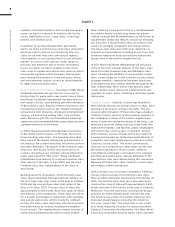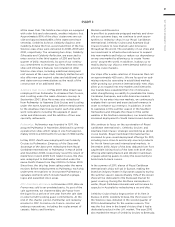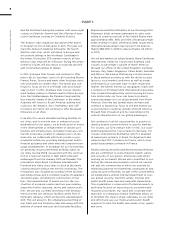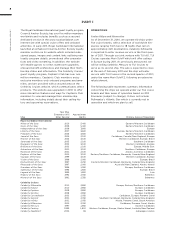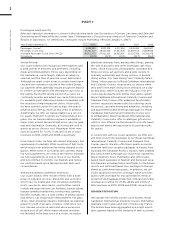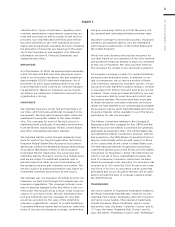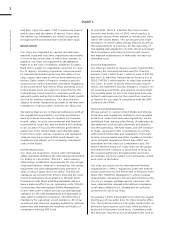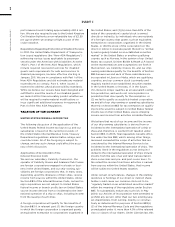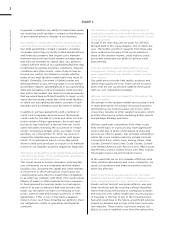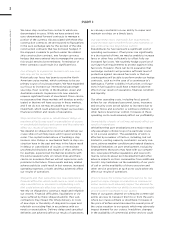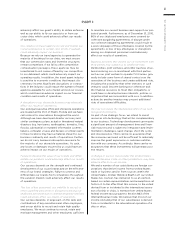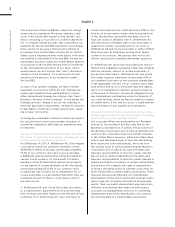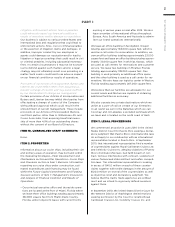Royal Caribbean Cruise Lines 2010 Annual Report Download - page 27
Download and view the complete annual report
Please find page 27 of the 2010 Royal Caribbean Cruise Lines annual report below. You can navigate through the pages in the report by either clicking on the pages listed below, or by using the keyword search tool below to find specific information within the annual report.
2010 ANNUAL REPORT 24
PART I
performance bonds totaling approximately £30.5 mil-
lion. We are also required to pay to the United Kingdom
Civil Aviation Authority a non-refundable levy of £2.50
per guest where we arrange a flight as part of the
cruise vacation.
Regulations Regarding Protection of Disabled Persons
In 2010, the United States Department of Transpor ta-
tion issued regulations (the “New ADA Regulations”)
addressing various issues applicable to passenger
vessels under the American with Disabilities Act (the
“ADA”). Part I of the New ADA Regulations, which
include required reservation policies for disabled
guests and requirements for aids and services to
disabled passengers, became effective starting in
January 2011. We are in compliance with Part I of the
New ADA Regulations and did not make any material
expenditures to comply. Part II, when issued, is
expected to address physical accessibility standards.
While we believe our vessels have been designed and
outfitted to meet the needs of our disabled guests,
we cannot at this time accurately predict whether we
will be required to make material modifications or
incur significant additional expenses in response to
Part II of the New ADA Regulations.
TAXATION OF THE COMPANY
UNITED STATES FEDERAL INCOME TAX
The following discussion of the application of the
United States federal income tax laws to us and our
subsidiaries is based on the current provisions of
the United States Internal Revenue Code, Treasury
Depart ment regulations, administrative rulings, and
court decisions. All of the foregoing is subject to
change, and any such change could affect the accu-
racy of this discussion.
Application of Section 883 of the
Internal Revenue Code
We and our subsidiary, Celebrity Cruises Inc., the
operator of Celebrity Cruises and Azamara Club Cruises,
are foreign corporations engaged in a trade or busi-
ness in the United States, and our ship-owning sub-
sidiaries are foreign corporations that, in many cases,
depending upon the itineraries of their ships, receive
income from sources within the United States. Under
Section 883 of the Internal Revenue Code, certain for-
eign corporations are not subject to United States
federal income or branch profits tax on United States
source income derived from or incidental to the inter-
national operation of a ship or ships, including income
from the leasing of such ships.
A foreign corporation will qualify for the benefits of
Section 883 if, in relevant part: (1) the foreign country
in which the foreign corporation is organized grants
an equivalent exemption to corporations organized in
the United States; and (2)(A) more than 50% of the
value of the corporation’s capital stock is owned,
directly or indirectly, by individuals who are residents
of a foreign country that grants such an equivalent
exemption to corporations organized in the United
States, or (B) the stock of the corporation (or the
direct or indirect corporate parent thereof) is “primar-
ily and regularly traded on an established securities
market” in the United States or another qualifying
country such as Norway. In the opinion of our United
States tax counsel, Drinker Biddle & Reath LLP, based
on the representations and assumptions set forth in
that opinion, we, Celebrity Cruises Inc. and our ship-
owning subsidiaries qualify for the benefits of Section
883 because we and each of those subsidiaries are
incorporated in Liberia or Malta, which are qualifying
countries, and our common stock is primarily and
regularly traded on an established securities market
in the United States or Norway. If, in the future,
(1) Liberia no longer qualifies as an equivalent exemp-
tion jurisdiction, and we do not reincorporate in a
jurisdiction that does qualify for the exemption, or
(2) we fail to qualify as a publicly traded corporation,
we and all of our ship-owning or operating subsidiaries
that rely on Section 883 for tax exemption on qualify-
ing income would be subject to United States federal
income tax on their United States source shipping
income and income from activities incidental thereto.
We believe that most of our income and the income
of our ship-owning subsidiaries is derived from or
incidental to the international operation of a ship or
ships and, therefore, is exempt from taxation under
Section 883. In 2005, final regulations became effec-
tive under Section 883, which, among other things,
narrowed somewhat the scope of activities that are
considered by the Internal Revenue Service to be
incidental to the international operation of ships. The
activities listed in the regulations as not being inci-
dental to the international operation of ships include
income from the sale of air and land transportation,
shore excursions and pre- and post-cruise tours. To
the extent the income from these activities is earned
from sources within the United States, that income
will be subject to United States taxation.
Under certain circumstances, changes in the identity,
residence or holdings of our direct or indirect share-
holders could cause our common stock not to be
“regularly traded on an established securities market”
within the meaning of the regulations under Section
883. To substantially reduce any such risk, in May
2000, our Articles of Incorporation were amended to
prohibit any person, other than our two existing larg-
est shareholders, from owning, directly or construc-
tively as determined for purposes of Section 883(c)
(3) of the Internal Revenue Code and the regulations
promulgated under it, more than 4.9% of the relevant
class or classes of our shares. Under Liberian law, this


